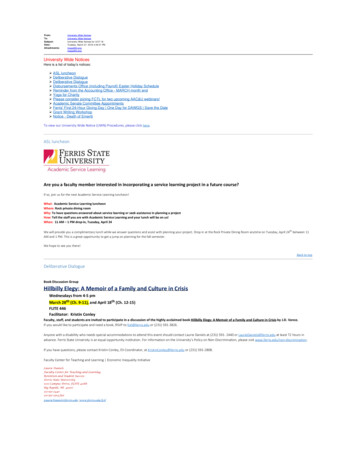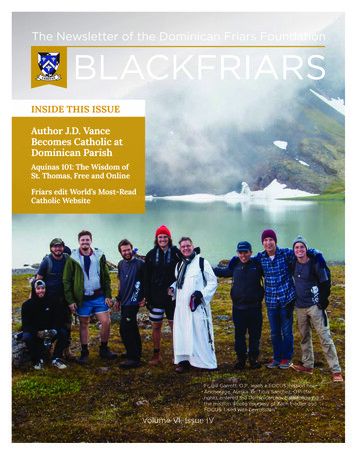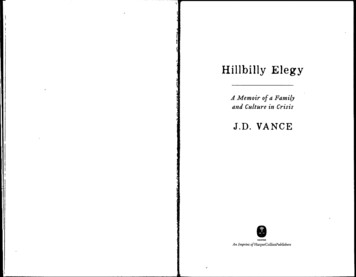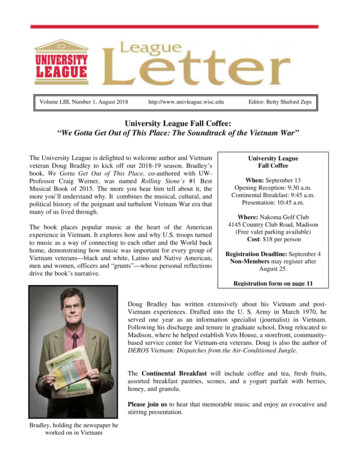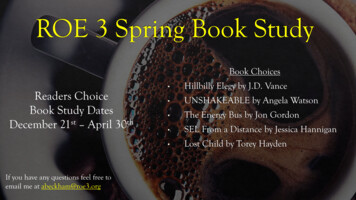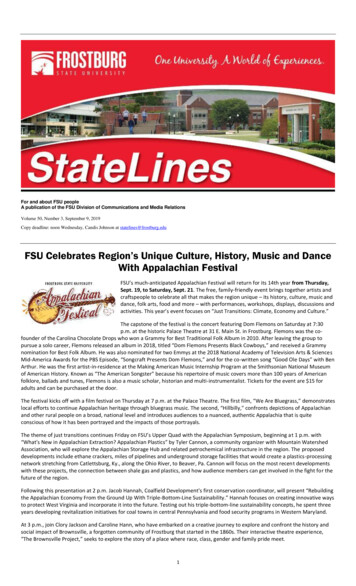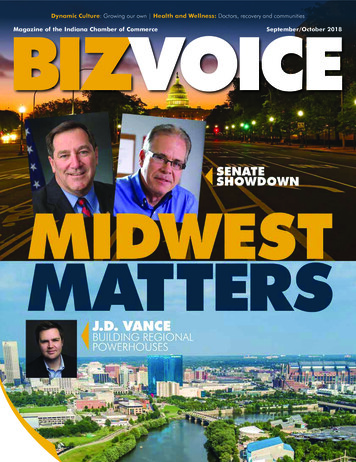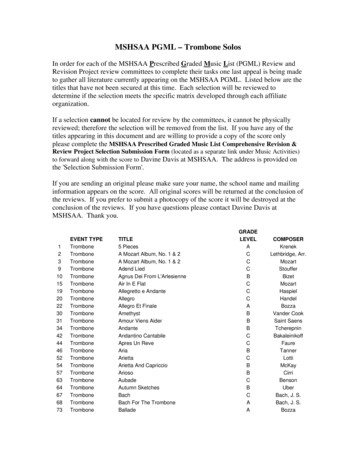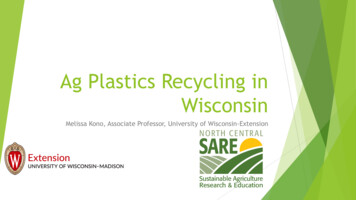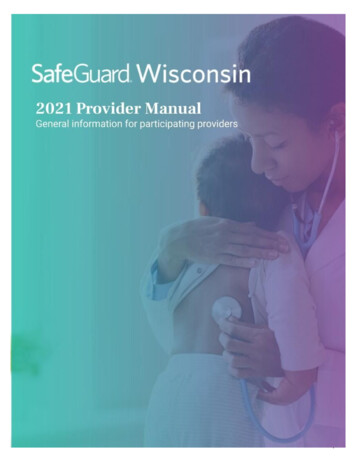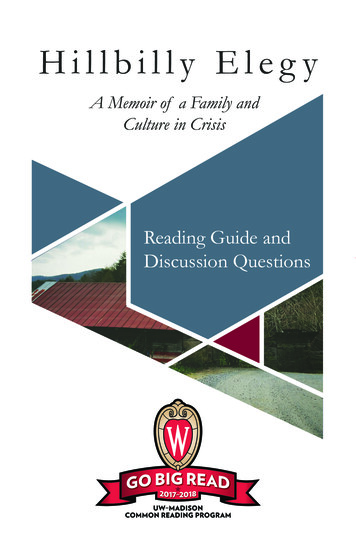
Transcription
Hillbilly ElegyA Memoir of a Family andCulture in CrisisReading Guide andDiscussion Questions
ABOUT THE PROGRAMGo Big Read is an initiative of the Office of the Chancellor at theUniversity of Wisconsin-Madison. The program engages membersof the campus community and beyond in a shared, academicallyfocused reading experience.The aims of Go Big Read are to: Engage the campus community and beyond in an academicallyfocused reading experience Generate vigorous discussions and exchanges of diverse ideas Promote connections among students, faculty, staff, alumni, andthe wider community Tap into and promote the intellectual resources of the campus Promote educational initiatives and learning outcomes Bridge learning experiences inside and outside the classroomABOUT THE BOOK“IHillbilly Elegy, by J.D. Vance, is a personal reflectionon upward mobility in America seen through the lensof a white, working-class family in the Midwest. Thememoir traces both Vance’s family history and his owndevelopment from the hills of Jackson, Kentucky tothe rustbelt town of Middletown, OH.want people to understand the American Dreamas my family and I encountered it. I want people tounderstand how upward mobility really feels. And I wantpeople to understand something I learned only recently: thatfor those of us lucky enough to live the American Dream,the demons of the life we left behind continue to chase us.”
THEMESSocial Class Family sponsibilityHillbilly PaydayLendingElegy HonorMilitaryWork eligionChildhoodLoyaltyPovertyAmericanDream LoveRESOURCESThere are many resources to support readers in developing anunderstanding of the book’s themes, including many on the UWMadison campus. For additional resources, please visit the Go BigRead website: gobigread.wisc.edu/resources Addiction Research Centerdionysus.psych.wisc.edu Applied Population Labwww.apl.wisc.edu Center for Educational Opportunityceo.wisc.edu Institute for Research on Povertywww.irp.wisc.edu State of WI Child Abuse & Neglect Prevention Boardpreventionboard.wi.gov Veteran Services & Military Assistance Centerveterans.wisc.edu
DISCUSSION QUESTIONS In the book’s introduction, Vance states that his success had littleto do with his own intelligence or extraordinary ability, and muchmore to do with “a handful of loving people” who rescued him(p. 2). Despite this, throughout the book Vance draws attentionagain and again to the element of personal responsibility, perhapsnowhere so clearly as in relating Mamaw’s flood parable: “Godhelps those who help themselves” (p. 87). Where else do you seethis tension between personal responsibility and the need forfamilial, governmental, or social support? Vance cites a report by the Wisconsin Children’s Trust Fund statingthat well over half of working-class people had suffered at leastone adverse childhood experience (ACE), and over 40 percenthad experienced several (p. 226-7). He writes extensively abouthis own traumatic childhood: his mother’s drug addiction andarrest, the constant revolving door of father figures, and Papaw’salcoholism, among others. Which of these experiences appear toaffect Vance most deeply, and why? How does the author copewith and eventually break free from such a difficult childhood?Although Vance acknowledges Mamaw’s and Papaw’s tumultuousmarriage as a key factor in his mother’s troubles—“Mom is theVance child who lost the game of statistics” (p. 232)—in whatways do his grandparents’ actions and attitude contribute to hissuccess? Poverty drives many residents of Jackson and other Appalachiancommunities to migrate to industrialized towns with betteremployment opportunities, but those opportunities graduallyerode. What role does globalization play in industrializedcommunities like Middletown? What factors cause some residentsto stay, despite the economic warning signs? Vance discusses the inner conflict he feels as someone whohas moved from poverty into a higher social class, musing that“Sometimes I view members of the elite with an almost primal
DISCUSSION QUESTIONSscorn. But I have to give it to them: Their children are happier andhealthier, their divorce rates lower, their church attendance higher,their lives longer. These people are beating us at our own damnedgame” (p. 253). While Vance’s income bracket has presumablyshifted, his statement indicates that his identity remains tied tohis working-class roots. Is Vance now one of “these people,” ordo his childhood experiences excuse him from acknowledging hiscurrent privilege? Do you think it’s possible to completely shiftone’s identity from one class to another? What factors definesocial class, and how is class membership determined? Vance discusses education in a multitude of ways. At one pointhe states, “In Middletown, 20 percent of the public high school’sentering freshmen won’t make it to graduation. Most won’t graduatefrom college” (p. 56). Though Vance struggled in school throughmuch of his childhood, when he stayed with his grandmother hissenior year, he was able to focus on school and found teacherswho inspired his love of learning (p. 151). He remembers whenMamaw spent 180 on a graphing calculator when they had littlemoney for other things like cell phones and nice clothes (p. 137).In the end, Vance goes on to earn a law degree from Yale. Howdoes Vance view the role of education in society and its impacton his own life? What are the factors that allow someone to excelin school? And what is society’s role in ensuring external factorsdon’t impede educational opportunities? Throughout his memoir, Vance talks about government policyand programs. At one point in the story, he describes hisexperience working at a grocery store and his encounters withcustomers using food stamps: I “learned how people gamed thewelfare system. They’d buy two dozen-packs of soda with foodstamps and then sell them at a discount for cash. They’d ring uptheir orders separately, buying food with food stamps, and beer,wine, and cigarettes with cash” (p. 139). How does Vance portraypeople receiving government assistance? How does this compare
DISCUSSION QUESTIONSwith his portrayal of his own family’s poverty? What other factorsmight impact the way people prioritize their spending? Are thereother issues and complexities that contribute to the poverty hewitnesses? In spite of his identity as a tall, white, straight male, Vance feltout of place at Yale, noting, “A part of me had thought I’dfinally be revealed as an intellectual fraud, that the administrationwould realize they’d made a terrible mistake and send me backto Middletown with their sincerest apologies” (p. 201). Fromconfusing financial aid forms, to social class signifiers (“tap orsparkling” water), to critical steps for professional advancement(membership in law journals), first-generation college studentsoften encounter intentional or unintentional gatekeepingmechanisms which can communicate to these students that theydon’t belong. What can be done to, as Vance puts it, “create aspace for the J.D.s” (p. 256) of the world in higher education?How do systems work to discourage upward mobility and keeppeople within their social groups? A number of people have pointed to Hillbilly Elegy to explain theresults of the 2016 election. In the memoir, Vance recalls how atthe age of 17, he realized that the “‘party of the working man’—the Democrats—weren’t all they were cracked up to be” (p. 140).He goes on to argue that people in Appalachia and the South“went from being staunchly Democratic to staunchly Republicanin less than a generation” (p. 140), and attributes a big part of thisshift to white working-class people seeing other poor people takeadvantage of government assistance. Do you agree with Vance’sassertion? Are there challenges in using one individual’s experienceto explain larger social shifts? Do you think this book explains theresults of the 2016 election?For more questions, visit: gobigread.wisc.edu/resources
SELECTION PROCESSEach winter, members of the campus community and beyond areinvited to submit nominations for the next Go Big Read book. Acommittee of faculty, students, staff, and community partners thensifts through hundreds of nominations to arrive at a shortlist whichthey carefully read and evaluate for inclusion in the program. Aselect list is then shared with the Chancellor, who makes the finaldecision.The ideal Go Big Read book should have the following qualities: Be readable, relevant, engaging, and well-written Appeal to people with diverse backgrounds and experiences Encompass sufficient depth and scope to generate discussionsfrom different points of view Be conducive to teaching and learning, and offer opportunitiesfor integration into academic programs Lend itself to a variety of activities and programmingThe ideal book might also have a subject or author with a Wisconsinconnection, an author who may be able to visit campus, crossdisciplinary appeal, and promote the Wisconsin Experience byengaging “issues that matter.”NOTES
CONTINUE THE CONVERSATIONGo Big Read Expert PanelShannon Hall - Memorial Union TheaterMonday, October 9th, 20177:00 p.m.Visit the Go Big Read events calendar for book discussions,programs, and events taking place throughout the academic year:gobigread.wisc.edu/eventsSPONSORSGo Big Read is sponsored by the Office of the Chancellor in partnership withthe Applied Population Lab; Center for the First-Year Experience; Centerfor the Humanities; College of Letters & Science; Distinguished LectureSeries; Division of Enrollment Management; Division of Student Life;Institute for Research on Poverty; Madison Public Library; Morgridge Centerfor Public Service; Office of the Vice Provost for Teaching and Learning;University Communications; University Housing; UW–Madison College ofAgricultural & Life Sciences; UW–Madison Libraries; UW–Madison Schoolof Education; Wisconsin Alumni Association; Wisconsin Book Festival; andWisconsin Union Directorate.CONTACT ad
Hillbilly Elegy, by J.D. Vance, is a personal reflection on upward mobility in America seen through the lens of a white, working-class family in the Midwest. The memoir traces both Vance’s family history and his own development from the hills of Jackson, Kentucky to the rustbelt town of Middletown, OH. “I
